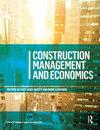Surviving adversity: personal and career resilience in the AEC industry during the COVID-19 pandemic
IF 3
Q2 BUSINESS
引用次数: 7
Abstract
Abstract This study aimed to explore the personal and career resilience of project management practitioners working in the Architectural, Engineering, and Construction (AEC) industries and their organizational support in the context of the COVID-19 pandemic. The global pandemic offered a unique opportunity to explore resilience both as a state (using quantitative scales) and as a process (using qualitative responses) in the context of a shared transboundary disturbance in normal routines. A mixed methods approach was used to triangulate quantitative and qualitative data from an online survey which included established scales and open-ended questions. Informed by a total of 121 valid survey responses, hierarchical regression analysis of the scales provided insights into the relationship between career and personal resilience and how personal resilience contributed to greater career resilience and the ability to positively adapt to the pandemic’s consequences. The quantitative analysis was complemented by a thematic analysis of the open-ended responses to identify the forms of organizational support that were important for resilience building during the pandemic. Organizational resources, such as training, mentoring, increased communication, and greater management support fostered employee adaptation to the pandemic shock. Evidence-based recommendations are made for AEC organizations to facilitate better workforce preparation for future adversities through providing effective resilience-promoting support mechanisms. The findings add to the body of knowledge by providing a better understanding of the importance of personal and career resilience and the role of organizational support in the process of resilience-building during adversities.逆境中的生存:新冠肺炎大流行期间AEC行业的个人和职业韧性
摘要本研究旨在探讨新冠肺炎大流行背景下,建筑、工程和建设(AEC)行业项目管理从业者的个人和职业弹性及其组织支持。全球大流行提供了一个独特的机会,可以在正常生活受到共同跨界干扰的背景下,探索作为一个国家(使用定量尺度)和作为一个过程(使用定性反应)的复原力。采用混合方法对在线调查的定量和定性数据进行三角测量,该调查包括既定量表和开放式问题。根据总共121份有效的调查答复,对量表进行分层回归分析,可以深入了解职业复原力与个人复原力之间的关系,以及个人复原力如何有助于提高职业复原力和积极适应大流行后果的能力。定量分析得到了对不限成员名额答复的专题分析的补充,以确定在大流行病期间对建立复原力很重要的组织支持形式。组织资源,如培训、指导、加强沟通和更多的管理支持,促进了员工适应大流行的冲击。为AEC组织提出了基于证据的建议,通过提供有效的促进弹性的支持机制,促进更好的劳动力为未来的逆境做好准备。这些发现通过更好地理解个人和职业弹性的重要性以及逆境中组织支持在弹性建设过程中的作用,增加了知识体系。
本文章由计算机程序翻译,如有差异,请以英文原文为准。
求助全文
约1分钟内获得全文
求助全文
来源期刊

Construction Management and Economics
BUSINESS-
CiteScore
7.50
自引率
14.70%
发文量
58
期刊介绍:
Construction Management and Economics publishes high-quality original research concerning the management and economics of activity in the construction industry. Our concern is the production of the built environment. We seek to extend the concept of construction beyond on-site production to include a wide range of value-adding activities and involving coalitions of multiple actors, including clients and users, that evolve over time. We embrace the entire range of construction services provided by the architecture/engineering/construction sector, including design, procurement and through-life management. We welcome papers that demonstrate how the range of diverse academic and professional disciplines enable robust and novel theoretical, methodological and/or empirical insights into the world of construction. Ultimately, our aim is to inform and advance academic debates in the various disciplines that converge on the construction sector as a topic of research. While we expect papers to have strong theoretical positioning, we also seek contributions that offer critical, reflexive accounts on practice. Construction Management & Economics now publishes the following article types: -Research Papers -Notes - offering a comment on a previously published paper or report a new idea, empirical finding or approach. -Book Reviews -Letters - terse, scholarly comments on any aspect of interest to our readership. Commentaries -Obituaries - welcome in relation to significant figures in our field.
 求助内容:
求助内容: 应助结果提醒方式:
应助结果提醒方式:


